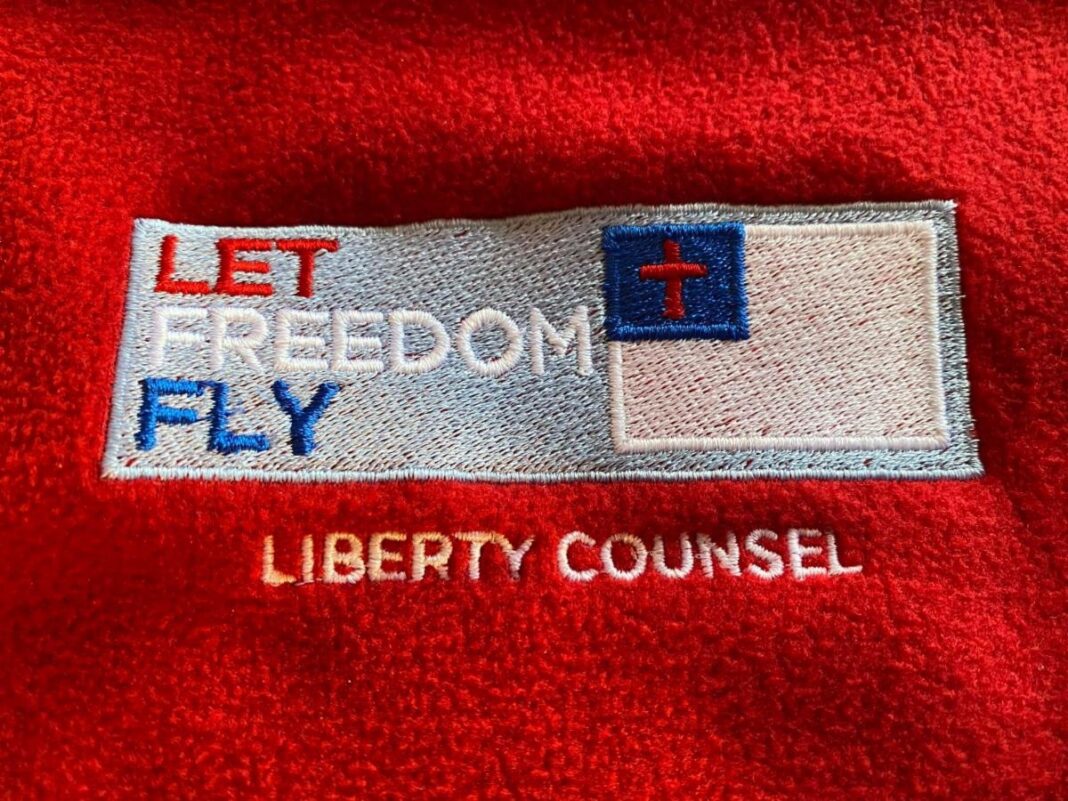One year ago today, Liberty Counsel Founder and Chairman Mat Staver presented oral argument to the U.S. Supreme Court in Shurtleff v. City of Boston, arguing that the City of Boston violated the Constitution by censoring a private flag in a public forum open to “all applicants” merely because the application referred to it as a “Christian flag.” Boston argued that despite the policy and longstanding practice, the private flag raisings were government speech.
As a result, on May 2, 2022, the High Court ruled 9-0 that the City of Boston violated the Constitution, the censorship was viewpoint discrimination, and there was no Establishment Clause defense. The Court rejected Boston’s reliance on the 51-year-old “Lemon test” from the case of Lemon v. Kurtzman. This unanimous decision was decades in the making and will impact future generations. When Liberty Counsel was founded in 1989, one of the goals was to strengthen the right to free speech, free exercise of religion, and overturn the “Lemon test.” In 2022, this vision became reality.
Liberty Counsel represented Boston resident Hal Shurtleff and his Christian civic organization, Camp Constitution. Shurtleff and Camp Constitution first asked the city in 2017 for a permit to raise the Christian flag on Boston City Hall flagpoles to commemorate Constitution Day and Citizenship Day (September 17) and the civic and cultural contributions of the Christian community to the City of Boston, the Commonwealth of Massachusetts, religious tolerance, the Rule of Law and the U.S. Constitution.
For 12 years from 2005-2017, Boston approved 284 flag-raisings by private organizations with no denials on the flagpoles that it designated as a “public forum.” Had the flag been referred to as anything but Christian, the city would have approved it. The flag itself was not the problem; it was the word “Christian” describing it in the application that was the issue. The year before Camp Constitution’s application (2016-2017), Boston approved 39 private flag-raising events, which averaged three per month. In 2018, Boston approved 50 private flag raising events, averaging nearly one per week. One included a flag of a private credit union.
In the opinion for Shurtleff, the Justices commented on the longstanding test known as the “Lemon test” which has been used to determine if a law violates the First Amendment Establishment Clause. Its name comes from Lemon v. Kurtzman. This test has proven to be unworkable and has led to inconsistent and contradictory decisions involving religious expression, symbols, and displays.
Justice Gorsuch, joined in a concurrence with Justice Thomas, stated, “It’s time to let Lemon lie in its grave.”
Justice Gorsuch continued, “How did the city get it so wrong? To be fair, at least some of the blame belongs here and traces back to Lemon v. Kurtzman, 403 U. S. 602 (1971). Issued during a ‘bygone era’ when this Court took a more freewheeling approach to interpreting legal texts, Food Marketing Institute v. Argus Leader Media, 588 U. S. ___, ___ (2019) (slip op., at 8), Lemon sought to devise a one-size-fits-all test for resolving Establishment Clause disputes. That project bypassed any inquiry into the Clause’s original meaning. It ignored longstanding precedents. And instead of bringing clarity to the area, Lemon produced only chaos. In time, this Court came to recognize these problems, abandoned Lemon, and returned to a more humble jurisprudence centered on the Constitution’s original meaning. Yet in this case, the city chose to follow Lemon anyway. It proved a costly decision, and Boston’s travails supply a cautionary tale for other localities and lower courts. The only sure thing Lemon yielded was new business for lawyers and judges.”
“Ultimately, Lemon devolved into a kind of children’s game. Start with a Christmas scene, a menorah, or a flag. Then pick your own ‘reasonable observer’ avatar. In this game, the avatar’s default settings are lazy, uninformed about history, and not particularly inclined to legal research. His default mood is irritable. To play, expose your avatar to the display and ask for his reaction. How does he feel about it? Mind you: Don’t ask him whether the proposed display actually amounts to an establishment of religion. Just ask him if he feels it ‘endorses’ religion. If so, game over,” wrote Gorsuch.
On June 27, 2022, SCOTUS referred to Liberty Counsel’s Shurtleff victory when it ruled 6-3 in Kennedy v. Bremerton School District in favor of a high school football coach who was fired for silently praying on the field after games. Liberty Counsel also filed an amicus briefin support of Coach Joe Kennedy, an 18-year Marine veteran. Relying on both the First Amendment Free Speech and Free Exercise Clauses, the High Court ruled that the Bremerton School District violated both provisions when it fired Coach Kennedy for having prayer on the 50-yard line of the football field after the game.
The Court also finally buried the court-made “Lemon test,” citing Liberty Counsel’s 9-0 decision handed down in the Shurtleff case.
The Court wrote: “In fact, just this Term the Court unanimously rejected a city’s attempt to censor religious speech based on Lemon and the endorsement test (See Shurtleff, 596 U. S.).
“The unanimous Supreme Court decision struck a blow to governments that attempt to censor religious viewpoints. The legal precedent for the case involving the Christian flag in Boston was decades in the making building upon one precedent after another extending back to the early 1990s. The Shurtleff v. City of Boston case will continue to impact free speech rights for generations,” said Staver.
Staver added, “After my oral argument, an immigrant from Sudan thanked me for defending religious viewpoints. He told me this reminded him about what Christians face in that country. If they confess Christ, they are beheaded. If they deny Christ, they can live. He said that Boston attempted to force people to deny Christ. In America, we must always stand for our faith.”
For more information on the case, visit www.LC.org/flag.
















